九年级英语情态动词最全版讲解.
初三英语中考语法一轮复习讲义(二十八)should,ought to,had better,have to最全用法总结与整理
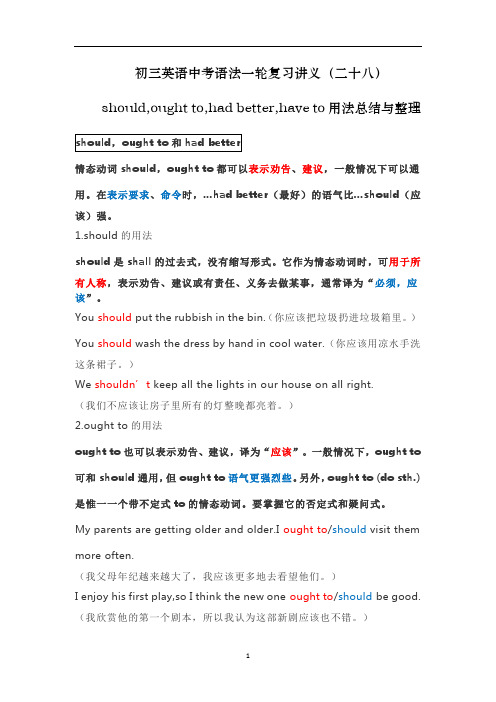
初三英语中考语法一轮复习讲义(二十八)should,ought to,had better,have to用法总结与整理should,ought to和had better情态动词should,ought to都可以表示劝告、建议,一般情况下可以通用。
在表示要求、命令时,...had better(最好)的语气比...should(应该)强。
1.should的用法should是shall的过去式,没有缩写形式。
它作为情态动词时,可用于所有人称,表示劝告、建议或有责任、义务去做某事,通常译为“必须,应该”。
You should put the rubbish in the bin.(你应该把垃圾扔进垃圾箱里。
)You should wash the dress by hand in cool water.(你应该用凉水手洗这条裙子。
)We shouldn’t keep all the lights in our house on all right.(我们不应该让房子里所有的灯整晚都亮着。
)2.ought to的用法ought to也可以表示劝告、建议,译为“应该”。
一般情况下,ought to 可和should通用,但ought to语气更强烈些。
另外,ought to (do sth.)是惟一一个带不定式to的情态动词。
要掌握它的否定式和疑问式。
My parents are getting older and older.I ought to/should visit them more often.(我父母年纪越来越大了,我应该更多地去看望他们。
)I enjoy his first play,so I think the new one ought to/should be good. (我欣赏他的第一个剧本,所以我认为这部新剧应该也不错。
)1.have to的肯定句句型:主语+have/has/had/will have to+动词原形+……We have to stay there for three hours.(我们不得不在那儿呆上3个小时。
Unit+1+情态动词need和should+++单元语法讲义-冀教版英语九年级全册
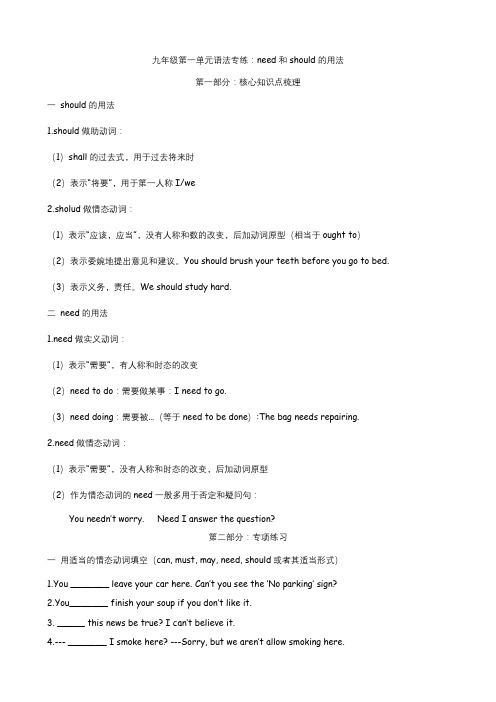
九年级第一单元语法专练:need和should的用法第一部分:核心知识点梳理一should的用法1.should做助动词:(1)shall的过去式,用于过去将来时(2)表示“将要”,用于第一人称I/we2.sholud做情态动词:(1)表示“应该,应当”,没有人称和数的改变,后加动词原型(相当于ought to)(2)表示委婉地提出意见和建议。
You should brush your teeth before you go to bed. (3)表示义务,责任。
We should study hard.二need的用法1.need做实义动词:(1)表示“需要”,有人称和时态的改变(2)need to do:需要做某事:I need to go.(3)need doing:需要被…(等于need to be done):The bag needs repairing.2.need做情态动词:(1)表示“需要”,没有人称和时态的改变,后加动词原型(2)作为情态动词的need一般多用于否定和疑问句:You needn’t worry. Need I answer the question?第二部分:专项练习一用适当的情态动词填空(can, must, may, need, should或者其适当形式)1.You _______ leave your car here. Can’t you see the ‘No parking’ sign?2.You_______ finish your soup if you don’t like it.3. _____ this news be true? I can’t believe it.4.--- _______ I smoke here? ---Sorry, but we aren’t allow smoking here.5.He_______ be the actor, I have seen him on TV.6.I think today’s children_______ learn to respect their elders.7.She_______ swim, but I can’t.8.She said she_______ retire, but she was not sure.9. The clothes _______ washing, they look so dirty.10.You _______ push, there is a lot of room on the bus.二选择( ) 1.We_______build our country into a country of peace and wealth.A mightB shouldC could( ) 2.Dogs _______ run through soccer games at the park. It’s dangerous.A shouldB shouldn’tC needD needn’t( ) 3.To keep children safe, we_______ put the things like knives medicine away in our house.A mayB shouldC canD might( ) 4.Now most young people like shopping online because they_______ spend a lot of time going from shop to shop.A needn’tB can’tC mustn’tD shouldn’t( ) 5.In order to speak English better, we_______ be afraid of failure.A shouldB shouldn’tC have toD could( ) 6.Let’s take a bus, little children _______ tickets.A needn’t buyB needn’t to buyC don’t need buyD needn’t buying( ) 7. —It nearly took me an hour to walk here.—Have a drink, then. You_______be thirsty.A. mustB. shouldC. can( ) 8.—Do you have any plans about this summer vacation?—I_______go to Australia for vacation, but I haven’t decided yet.A. can’tB. mustC. may( ) 9.Please don’t make so much noise. I _______hear what the speaker is saying.A. needn’tB. mustn’tC. can’t( ) 10.—Excuse me, is this the way to the cinema?—Sorry, I’m not sure. But it _______be.A. mustn’tB. mightC. can’t( ) 11.—Mom, must I stay there the whole day?—No, you _______.You _______come back after lunch, if you like.A. mustn’t; canB. needn’t; mustC. needn’t; may( ) 12.—Is that Lucy’s car?—It _______be hers. She has just gone for a meeting.A. can’tB. shouldC. mustn’t( ) 13---Tom, do n’t drive too fast, you _________ hit the others’ cars. ---OK.A.may B.need C must D.have to( ) 14---Must I hand in all my money, Mum?---No, you _________. You can use it to buy some school things.A.mustn’t B.can’t C.needn’t D.should( ) 15---Susan, would you like to go hiking with us this afternoon?---I’d love to, but I _________ study for a test.A.may B.can C.will D.have to三句型1.I must go home now, it’s too late.(变为否定句)___________________________________2.I think he must be an engineer.(变为否定句)___________________________________3.You should finish your homework first.(否定句)___________________________________4.---Need I do the things right now?(做出肯否回答)---________,________ ________.(肯定回答)---________,________ ________.(否定回答)5.-- May I smoke here?---________,________ ________.(否定回答)。
Unit7情态动词表示推测语法知识清单人教版九年级英语全册
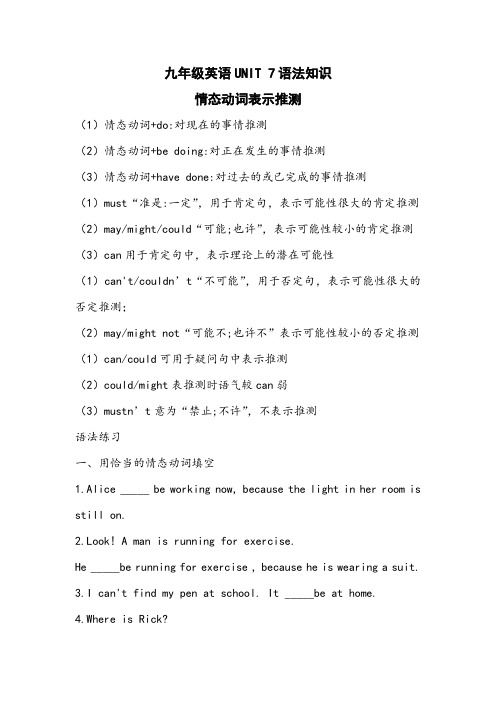
九年级英语UNIT 7语法知识情态动词表示推测(1)情态动词+do:对现在的事情推测(2)情态动词+be doing:对正在发生的事情推测(3)情态动词+have done:对过去的或已完成的事情推测(1)must“准是:一定”,用于肯定句,表示可能性很大的肯定推测(2)may/might/could“可能;也许”,表示可能性较小的肯定推测(3)can用于肯定句中,表示理论上的潜在可能性(1)can't/couldn’t“不可能”,用于否定句,表示可能性很大的否定推测;(2)may/might not“可能不;也许不”表示可能性较小的否定推测(1)can/could可用于疑问句中表示推测(2)could/might表推测时语气较can弱(3)mustn’t意为“禁止;不许”,不表示推测语法练习一、用恰当的情态动词填空1.Alice _____ be working now, because the light in her room is still on.2.Look! A man is running for exercise.He _____be running for exercise , because he is wearing a suit.3.I can't find my pen at school. It _____be at home.4.Where is Rick?He_____be in the classroom. I am not sure.5.The red truck_____ be Tom's. His is blue.二、单项填空。
( )6.(2023 广东中山一模)Look! The light in Lucy's office is still on. She _____ be working there.It _____be her. She has gone to Guangzhou on business.A. must; can'tB.can; mustn'tC.must; mustn'tD.may; needn’t( )7. Let's climb to the top of the mountain if you are not tired , shall we?You _____be kidding! I am afraid of high places!( )8.(2021 广东广州阶段练习)Mum,there is a beautiful box. What's in it?I’m not sure. It _____be a present from your aunt.( )9.(2022 广西玉林)Hey, whose basketball do you think this is?It _____belong to Linda. She likes playing basketball best in our class.A..mustB.canC. mustn'tD.can't( )10.(2022广西贵港期末)Where is Linda?I'm not sure. She _____in the school library.could be B.must be C.can't be D.will be( )11.(2022 广西贵港二秩)Smoking is not allowed in the forest. It ________kill animals and even people.A.needB.shouldC.mightD.can't( )12.(2022 四川成都开学考试改编)I think Dale is at home. be at home.He_____ be at home. He phoned me at the airport five minutes ago.A. might notB.mustn'tC.can'tD.needn't( )13.Whose notebook is it? Is it your partner's?No. It_____be hers. The handwriting is not so good as hers.A. mustn'tB.can'tC.couldn'tD. might not( )14.What do you think of this problem, Susan?It _____be very difficult. Even the top students can't solve it.( )15.(2022 甘肃甘南政编)Is that Jack over there?It_____ be him. He is having a piano lesson now.can't B. might not C.must D.could not( )16. Young boys should not _____to drive motorbike. It's dangerous.B.be allowingC.be allowed( )17. The old people must _____wellok aftere looked afterC. be looking afterD. looked after( )18. The sports meeting_____ on December 19th next term.A. HeldB.is heldC. will be held( )19. The seacrossing bridge _____in 2026.A.is pletedB.was pletedC. will be pleted( )20. All the teachers_____ to the party next week.will be invited B.will invite C.were invited三、用适当的情态动词补全下面短文。
人教版英语九年级全册Unit4(难点透视):情态动词would和used to的用法区别

情态动词would和used to的用法区别1. would 和used to都表示过去的习惯行为,意思为:过去常常。
would 表示过去某时间的意志、愿望和决心。
如:He would come to have a chat with us when he was free.他有空时,常会过来跟我们聊天He used to live in a cottage near the river. 他过去常住在河边的一座小木房里。
2. would 往往强调过去的一种可能性,而不暗示现在的情况;而used to强调过去常这样干,而现在不干了, 强调今惜对比。
如:He would sit there alone, thinking. 他会独自一人坐在那儿思考。
He used to swim in the river in summer. 夏天他常常在这条河里游泳。
3. would 作will的过去式,表示过去的一种意愿或将要做的事情,意思为:将会。
而used to无此意义。
如:People would go to ask him for advice when they came into trouble. 人们碰到麻烦事,就会去问他解决的办法。
4. would有时也可用来指现在,表示一种委婉、客气的请求,对于用它来提问题的回答,须用will,不能用would。
而used to无此意义及用法。
如:Would you please help me with this case? 请帮助我提一下这个箱子好吗?Yes, I’d like to. / I will. 好,我非常乐意。
5. would一般接表示动作的动词,不能与表示状态或情感、意识方面的词连用,而used to无此限制。
如:He would get here at eight. 他在八点会到这儿来。
He used to be / get here at eight. 他过去常在八点来这儿。
中考英语情态动词、助动词、系动词专项讲解
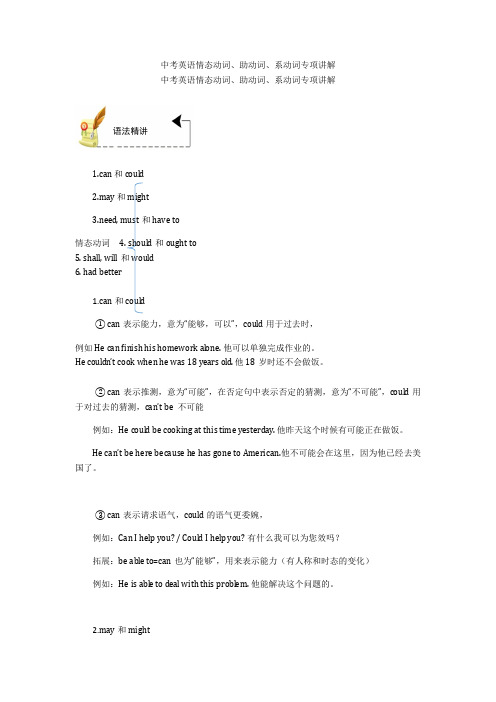
中考英语情态动词、助动词、系动词专项讲解中考英语情态动词、助动词、系动词专项讲解语法精讲1.can 和could2.may 和might3.need, must和have to情态动词 4. should和ought to5. shall, will和would6. had better1.can和coul d① can表示能力,意为“能够,可以”,could用于过去时,例如He can finish his homework al one. 他可以单独完成作业的。
He couldn’t cook when he was 18 years old. 他18岁时还不会做饭。
② can表示推测,意为“可能”,在否定句中表示否定的猜测,意为“不可能”,could用于对过去的猜测,can’t be 不可能例如:He could be cooking at this time yesterday. 他昨天这个时候有可能正在做饭。
He can’t be here be cause he has gone to American.他不可能会在这里,因为他已经去美国了。
③ can表示请求语气,coul d的语气更委婉,例如:Can I help you? / Coul d I help you? 有什么我可以为您效吗?拓展:be abl e to=can也为“能够”,用来表示能力(有人称和时态的变化)例如:He is able to d eal with this problem. 他能解决这个问题的。
2.may和 might① may表示请求,might语气更委婉,例如:May I help you?Might I sit here?② may表示肯定的推测,语气比can更弱,might对过去的推测例如:Mary may be doing her homework now.May can be doing her homework now. can表达的推测语气比may更强,更有把握。
第十三单元英语九年级知识点
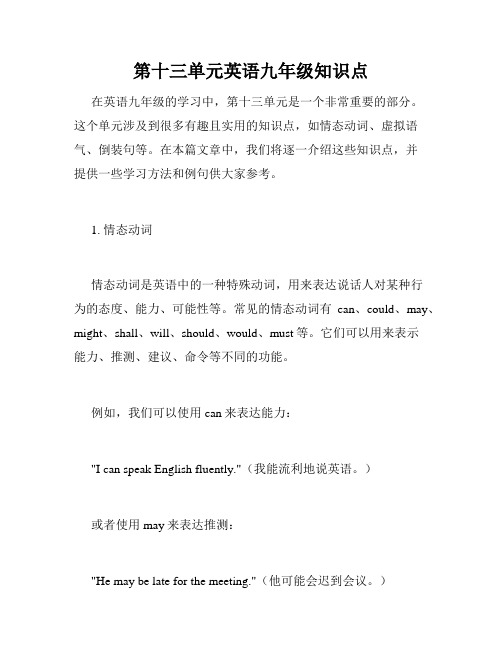
第十三单元英语九年级知识点在英语九年级的学习中,第十三单元是一个非常重要的部分。
这个单元涉及到很多有趣且实用的知识点,如情态动词、虚拟语气、倒装句等。
在本篇文章中,我们将逐一介绍这些知识点,并提供一些学习方法和例句供大家参考。
1. 情态动词情态动词是英语中的一种特殊动词,用来表达说话人对某种行为的态度、能力、可能性等。
常见的情态动词有can、could、may、might、shall、will、should、would、must等。
它们可以用来表示能力、推测、建议、命令等不同的功能。
例如,我们可以使用can来表达能力:"I can speak English fluently."(我能流利地说英语。
)或者使用may来表达推测:"He may be late for the meeting."(他可能会迟到会议。
)2. 虚拟语气虚拟语气是用来表达与现实事实相反或与过去相反的假设情况。
在使用虚拟语气时,我们需要注意动词的形式,如should、were、had、would等。
例如,在表示与现实情况相反的假设时,我们可以使用虚拟语气来表达:"If I were you, I would study harder."(要是我是你,我会更努力学习。
)在表示与过去相反的假设时,我们可以使用虚拟语气来表达:"He wished he had taken the job."(他希望他曾接受了这份工作。
)3. 倒装句倒装句是英语中常见的语法结构之一。
它的特点是主语和谓语的语序颠倒。
在一般疑问句和以never,not only...but also等词开头的句子中,需要使用倒装结构。
例如,在一般疑问句中,我们需要将助动词放在主语前面,改变句子的语序:"Do you like English?"(你喜欢英语吗?)在以never开头的句子中,我们需要将助动词放在主语前面,并且将其与主谓部分隔开:"Never have I seen such a beautiful sunset."(我从未见过如此美丽的日落。
九年级人教版英语情态动词用法总结(完整)及解析

九年级人教版英语情态动词用法总结(完整)及解析一、选择题1.-Do you mind telling me how to use this function? - . It’s easy. Just double-click on the “Pencil” icon.A.No, not at all B.Of course, I doC.Yes, I do D.Yes, I don’t2.—Are you going to offer some masks and alcohol wet wipes (酒精湿巾) to the people in the village?—________ They are in great need of these things.A.What a shame! B.Why not? C.Why me? D.What's wrong? 3.—I plan to find a part-time job in the coming summer holiday.—________ It will be a totally different experience.A.See you later. B.You’d better not.C.I’m sorry to know that.D.That sounds like fun.4.— I find it difficult to fall asleep before exams. Could you help me?— ___________. We have helped many students with similar problems.A.No problem B.Come on C.Well done D.What a pity 5.—I’m afraid I can’t get good grades in the P.E. exam.—________! Train as much as you can.A.Well done B.Keep trying C.Enjoy yourself D.Be careful 6.— I am so sorry to keep you waiting for such a long time.— ________.A.Please shut up B.It’s your mistake C.It doesn’t matter D.Don’t explain it 7.—I’m afraid I can’t do well in the sports meeting. I might let my classmates down.—_______. You don’t need to push yourself too hard.A.It’s a pleasure B.What a pity C.Take it easy D.Y ou’re welcome 8.—Amazingly, I've managed to finish the project by myself.—___________I told you it was easyA.With pleasure. B.Guess what? C.There you are! D.It doesn’t matter 9.–This box is too heavy for me to carry upstairs.–__________A.You may ask for help B.I’ll give you a handC.Please do me a favor D.I’d come to help10.—I’m sorry. That wasn’t of much help.— ________. In fact, it was most helpful.A.Thanks anyway B.It doesn’t matter C.Of course not D.Sure it was 11.—It’s been a wonderful p arty. Thank you very much?—- ________________.A.With pleasure B.No , thanks C.It’s OK D.I’m glad you enjoyed it .12.—Liz, I’d like to take a week’s holiday.—________. We’re as busy as a bee.A.Go ahead B.With pleasure C.Forget it D.That’s right 13.— What do you think of the movie Mr. Bea ?—____. It’s very funny.A.I can’t stand it .B.I don’t mind it C.I love it. D.I hate it. 14.—Don’t forget to keep safe distance (距离) at least one meter, Mike!—________A.Sorry, I won’t.B.No, I can’t do it.C.Not at all. D.I hope not. 15.—Lucy, can you help me with my history?—________. I am good at it.A.With pleasure B.I’m afraid not C.Sorry, I can’t D.No way 16.—I have got a new job as a presenter in the Wenzhou Radio Station!—________.A.Come on B.Good idea C.Congratulations D.All right 17.—TV says there will be a heavy rain tomorrow.—________. I planned to go climbing with my friend.A.Bad luck B.I hope so C.Good idea D.I don’t mind 18.—Do you like cartoons or scary movies?—_______. They can cheer me up.A.Yes, I do B.No, I don't C.Cartoons D.Scary movies 19.—You seem so happy today, Jack.—________? I won the first prize in the singing competition yesterday.A.So what B.How come C.Guess what D.Why not 20.—Susan, will you please go and empty that drawer?— _________ ?A.What for B.What is it C.How is it D.How come 21.—I’m going hiking this afternoon. Would you like to go with me?—______, but I must finish my homework first.A.Sorry, I don’t B.That’s right C.I’d love to D.Not at all 22.—Jim seems to be in low spirits. ________?—No one liked his plan. All his efforts were useless.A.Guess what B.What about him C.So what D.What happened 23.—________. Where’s the nearest supermarket?—Oh, it’s about 300 meters away, next to a park.A.Thank you B.Excuse me C.Come on D.That’s OK 24.—Anna, can you come to my party tomorrow night?—_________, but I have to stay at home because of the flu.A.I’d love to B.Sounds good C.That’s OK D.Why not 25.-Do you think the rain will stop tomorrow?-_____. It has rained for four days. It’s too wet everywhere.A.I hope not B.I don’t think soC.Don’t worry D.I hope so26.—I’ll have a chemistry exam tomorrow.—________!A.Well done B.Congratulations C.You’re welcome D.Good luck 27.—Would you mind if I open the window?—_______.We need fresh air.A.Not at all B.Yes, of course C.You’d better not D.That’s all right 28.—I find it really unwise to go travelling during May Day holiday.—________! Wherever you go, it’s crowded with cars and people.A.Not exactly B.Forget it C.You said it D.It depends 29.—Only those who have a lot in common can get along well.—________ Opposites sometimes attract.A.I think so. B.I don’t think so.C.I don’t care.D.I hope so. 30.—Only those who have a lot in common can get along well.—________. Opposites sometimes attract.A.I think so B.I don’t think so C.I don’t care D.I hope so 31.— May I have a look at the newspaper China Daily?— Certainly. ________A.Thank you. B.It’s a pity.C.Here you are. D.I’d like to. 32.—Hi, everybody! Here is the music.—________. Let’s dance to the music.A.That’s no good B.Here we go C.That’s a shame D.Have a good time 33.— Do you think Steve will pass the exam this time?— ________! He spends most of his time playing games on the phone.A.Promise B.No way C.Well done D.No problem 34.—________!—Yes. It sounds gentle and relaxing.A.How good the vegetable soup is B.How exciting the storybook isC.What nice music Ann is playing D.What a beautiful flower Jim keeps 35.—How about buying that coat?—________. It’s too expensive. I can’t afford it.A.That sounds good B.No way C.Good idea D.What a pity 36.—I wonder if Tenny is doing well in her new school.—________. She is old enough to look after herself well.A.You’re welcome B.Good luck C.It’s a pity D.No need to worry 37.—Our family will go to Hangzhou for a holiday this summer.—________.A.Well done B.I am glad to hear thatC.Best wishes to you D.Have fun38.— Wow, what a good smell! Can I have a piece of cake?— ________A.No way. B.Good idea! C.HeIp yourself. D.What a pity! 39.—Can you tell me how to get to the park?—________—Thank you all the same.A.Show me the map, please.B.Certainly. It’s opposite the museum.C.Sorry, I don’t know. I’m a stranger here.D.Sure. Turn right and go along Rock Road.40.— Would you mind my turning on the TV? The New Year concert has just begun.— ________. Just go ahead.A.Please don’t B.Better not C.Of course not D.I’m afraid not 41.—I prefer to chat online. I’ve got to know many friends on the Internet.—________. Few of them would become your real friends.A.I can’t agree more B.I’m pleased to know thatC.That’s for sure D.That’s not the case42.—We’ll study in different schools next term. I hope you’ll enjoy your time in the new school!—________A.I’ll take your advice. B.The same to you. C.Congratulations!D.It doesn’t matter.43.— The movie Lost in Russia sends a message about the importance of family.— ________. It reminds me of my parents.A.I hope so B.That’s all right C.You bet D.I don’t think so 44.—Michael was late for Mr. Smith’s ch emistry class this morning.—________? As far as I know, he never came late to class.A.So what B.Why not C.How come D.Who cares 45.— Are you feeling any better now after taking the medicine?—________. I’m feeling even worse.A.You got it B.Never mind C.Sorry to hear that D.Quite the opposite 46.— I guess you want to play tennis in the park this afternoon.—_______. That’s exactly what I was thinking just now.A.It’s up to you B.Of course not C.You read my mind D.It’s hard to say 47.—Can I look at the menu for a few more minutes before I decide?—Of course. ________, Sir.A.Make yourself at home B.Enjoy yourself C.It doesn’t matterD.Take your time48.—I’m so sorry to keep you waiting for me so long.— ________!A.With pleasure. B.Don’t say so C.I don’t think so D.It doesn’t matter 49.—I just got a message from Ms. Yang and she said she would come to our meeting this afternoon.— She always has good ideas.A.Why not? B.What a pity! C.Time is up. D.That’ll be very nice. 50.—I’ll be away on a busin ess trip. Would you mind looking after my cat?—Not at all. ________.A.It’s my pleasure B.I’d rather not.C.I’d like it.D.With pleasure.【参考答案】***试卷处理标记,请不要删除一、选择题1.A【解析】本题考查的是情景反应.根据意思可知答案为A解析:A【解析】本题考查的是情景反应.根据意思可知答案为A2.B【详解】句意:——你准备给村里的人提供口罩和酒精湿巾吗?——为什么不呢?他们非常需要这些东西。
情态动词表推测的讲解及练习题

九年级英语表推测语气的讲解与练习表推测时,英语中只使用must,may,might,may not和can't。
这五个表达的语气依次递减:情态动词must, can, could, may, might表推测的用法情态动词中的must, can, could, may, might都表推测。
其中must的可能性最大,can / could次之,may / might最小。
具体用法如下:1.must的用法(1)表示推测“可能性”时,意思是“一定、准是”,语气较肯定,较有把握。
He must be American. = It is certain that he is American. 他准是个美国人。
(2)must表推测只能用于肯定句。
如果要表示“一定不、肯定不”的意思时,应用can’t,如询问某种可能时,应用can。
He must know my address. 他肯定知道我的地址。
(一定)He can’t know my address. 他肯定不知道我的地址。
(一定不)Can he know my address? 他知道我的地址吗?(询问可能性)(3)must表示推测时,可以推测现在/正在发生的动作/过去发生的动作。
He must have a car now. (现在)他一定有辆小汽车。
He must be doing his exercises in the classroom.(正在进行)他一定在教室里做练习。
He must have finished the work.(过去发生)他一定已完成了工作。
注:must表示推测时很少用于将来的情况。
一般不用He must come tomorrow.可用It`s certain / I’m sure that he will come tomorrow.(4)在反意疑问句中,当附属部分含有表示推测意义的must时,疑问部分的助动词应与must 后面的动词在非推测情况下的用法保持一致。
- 1、下载文档前请自行甄别文档内容的完整性,平台不提供额外的编辑、内容补充、找答案等附加服务。
- 2、"仅部分预览"的文档,不可在线预览部分如存在完整性等问题,可反馈申请退款(可完整预览的文档不适用该条件!)。
- 3、如文档侵犯您的权益,请联系客服反馈,我们会尽快为您处理(人工客服工作时间:9:00-18:30)。
6
would, should为will,shall 的过去式,would用于现在时 ,表示委婉提出请求、建议或看法,如Would you please not do it again? should还有“应该”的意思,但语气比 must 弱。
would 1)will的过去式,表示过去时间的“意志、意愿”。 They would not let him in because he was poorly dressed. 他 们不让他进去因为他衣着破旧。 I said I would do anyth)would用于现在时间,表示比较委婉地提出请求、建议或 看法。 Would you like another glass of beer? 再来杯啤 酒好吗?
考点揭密
3 掌握常用情态动can, could, may, might, must, need, shall, will, should, would等的用法。 can can 可表示能力、允许、可能性、怀疑猜测,意为“能, 会,可以”;can't意为“不会,不能,不可以”,还有 “不可能”之意。could为can的过去式,用法与can类似 ,常用于过去时中;could还可用于现在时中表示委婉客 气,相当于can;could也可表示惊讶怀疑,不相信,如: He couldn't be a thief.
复习
情态动词
考点揭密
1 2 掌握情态动词的定义:表示可能、怀疑、允诺、愿望、义 务、必要、猜测等的动词是情态动词。 掌握情态动词的语法特征 1) 情态动词不能表示正在发生或已经发生的事情,只 表示期待或估计某事的发生。 2) 情态动词 除ought to do和have to do 外,其它 情态动词之后只能接动词原形。 3) 情态动词没有人称,数的变化,即情态动词第三人 称单数不加-s。 4) 情态动词没有非谓语形式,即没有不定式,分词, 等形式。
考点揭密
may
2
may表示允许、也许,意为“可以,也许,可能”。 对May I ……?一般问句的回答,肯定回答一般是:Yes, please./Certainly./ Sure等;否定回答一般是:Please don't./No,you can't/mustn't. might是may的过去式,与may用法类似,常用于过去时 中;用在疑问句中,还可表示委婉客气。
考点揭密
2. may (might) 1)表允许,询问或说明一件事可不可以做,might指过去时间;但在疑 问句中might也可指现在时间,语气比may更委婉。 May (Might) I ask for a photo of your baby? 我可以要一张你宝宝的照 片吗? 在回答以may引起的问句时,肯定回答是一般可仍用may,或 Yes, please. / Certainly./Sure./Of course. ; 否定回答根据说话人的语气由强到弱分别选用: must not(mustn’t)(禁止) / had better not(最好别)/ may not(不行) 2) may表可能,但所表示的可能性不如can所表示的那样肯定。might可以 指过去时间,也可以指现在时间,但语气更加不肯定。 He may be at home. 他可能在家。 They might be having a meeting, but I’m not sure. 他们有可能在开会, 不过我不肯定。
重难点解析
1
怎样选用can和may 情态动词can和may都能表示“可能性”。如: He may be right. 他可能对。 He can’t be right. 他不可能对。 那么,在表示可能性这个概念时,二者的区别是什么呢?
考点揭密
3
must must 表示必须要做的事,意为“必须,应该”。must一般 问句的否定回答用needn‘t或don’t have to,而不用mustn‘t, mustn’t意为“不可以,不能”,表禁止,不许可。另外, must还可表示有把握的推测,意为“一定、肯定”。 need need 作情态动词主要用于问句和否定句中,意为“必要 ”。need一般问句的肯定回答用 must,否定回答用 needn't,如:Need I do it right now?肯定回答:Yes, you must。否定回答:No, you needn't. need作行为动词,有 人称、数和时态的变化,后接动词要加to do不定式。
1
考点揭密
1.can (could主要指过去时间 ) 1) 表示人或物本身所具有的能力,意为“能,能够,会” : Two eyes can see more than one. / I can swim very well. 2) 表示可能(理论上或是逻辑判断上) He can’t (couldn’t) have enough money for a new car. 3) 表示允许: Can I have a look at your new pen? He asked whether he could take the book out of the reading-room. 4) 表示对现在动作或状态的猜测,主要用于否定句和疑问句中或感叹 句中: He can’t (couldn’t) be over sixty. 他不可能超过六十岁。 5)could表示比can更委婉客气的提出问题或陈述看法,指的是现在时 间。 Can (Could) you lend me a hand? 帮我一把好吗?
在回答以must开头的一般疑问句时, 否定式需用need not (needn’t),表示 “不必”的意思。如: — Must we hand in our exercises today? — Yes, you must. ( No, you needn’t)
4
考点揭密
5
shall, will用来征求对方意见,shall用于第一人称,will用 于第二人称,用来表示意愿;shall用于第二、第三人称, will用于第一人称。
